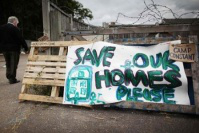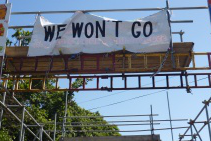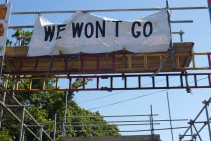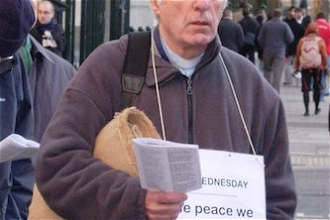Irish Travellers on the Westway
The Westway, in Ladbroke Grove, West London, is home to about 20 Irish Traveller families. Their caravans, immaculate with pots of flowers and lace curtains at the windows, are crammed underneath a labyrinth of motorway flyovers and railway lines. Traffic thunders by day and night and there have been several accidents - one of them fatal - when a lorry overshot a bend, shedding its load of beer barrels onto the caravan roofs. The driver died. More recently a lorry jackknifed and several one ton rolls of paper hurtled onto the site, crushing one caravan. Luckily the family were away. Because of the traffic fumes, in the summer especially, mothers hose down their windows and walls daily, and complain that their children suffer from respiratory illnesses.
Established in 1976, the Westway Travellers site is surrounded by garages and workshops. There is no pavement along the road leading to it. Mothers have to push prams along a bendy and pitted approach lane. There used to be another footpath. But when the Westway Development Trust took over some adjacent land to make riding stables, they blocked this with a concrete slab, leaving a 14-inch wide, 20-foot long unlit L-shaped passage, too narrow for a pram to pass through. A council spokesman said he was not aware this breached any regulations.
Although the setting is grim, the Westway Travellers site is a flagship nationally in terms of amenities provided by the local authority and other agencies. Recently Kensington and Chelsea completed a £1.16 million project providing each family unit with a separate bathroom and kitchen in a block next to the caravan. Residents are very pleased with these. The community has access to the full range of services provided by the council.
The Council part-funds the Catholic Children's Society which looks after pre-school and after-school groups at the site. Other agencies supporting the community include the Health Authority's Health Improvement Team and Sure Start.
Toni Liberg, a community worker from Catholic Childrens' Society is the only outsider who sees residents on a daily basis. She is based on the site in a cabin which houses playgroups, a homework centre, computer training suite and the health promotion team, who run exercises classes for mothers. Behind the cabin, the children have painted a mural on the wall alongside the railway track and created a small garden. This year she organised several outings for families.
Next year the Society is planning to start an oral history of the Travellers. Toni said: "People here are shy of talking with the authorities. It takes time to build up trust."
Tom Sweeney, who has lived on the Westway for 14 years and represents most of the families, said the Westway is the first site in England to have an on-site nursery, health and training facilities. A member of the Coalition of Gypsies and Travellers, Sweeney is campaigning for more improvements, including a strengthened road barrier, safe footpath, and children's playground. He wants his community to be given tenancies, rather than licences.
Nationally, the Coalition is campaigning for Travellers to be allowed to claim the Disability Facilities grant. It is also calling for more sites with better amenities and education facilities. Sweeney said: "In 1994 the Criminal Justice and Public Order Act abolished the duty imposed by the 1968 Caravan Sites Act, for local authorities to provide sites for Gypsies and Travellers.
"The January 2003 local authority figures show that some 21% of the Traveller population are technically homeless, without an authorised place to stop. "Together with a number of MPs, we are promoting the Traveller Law Reform Bill which calls on the government to provide more Travellers' sites. The Select Committee of the ODPM has proposed that the government introduce a statutory duty to provide or facilitate sites. The Institute for Public Research has produced a public consultation paper: 'Moving Forward' which suggests bringing this back as a statutory duty on local authorities."
At present, it seems Travellers are falling through the net with regard to housing provision. If they are considered homeless, local authorities will place them in temporary accommodation while they wait to be housed. But many who want to remain in their caravans are forced to keep on the move. The first major piece of legislation concerning Travellers was a last-minute amendment to the Anti-Social Behaviour Bill, giving local authorities fast track eviction powers. Most literature available from local authorities around the country, such as East Anglia, focusses on codes of practice in dealing with illegal encampments. Sweeney says many travellers complain of racist treatment.
"They are hoping we are going to go away" said Sweeney. "But we can't. As families have children there is nowhere for them to go - except into the community where they are forced to give up our way of life."
Kensington and Chelsea says its homelessness policy "is a community-wide strategy that applies to anyone in the Borough affected by homelessness, with specific emphasis on the prevention of homelessness." But it is one council which has made special efforts to recognise the particular needs of Travellers.
A spokesperson said: "The Royal Borough has worked with our local government partners Hammersmith and Fulham, to maintain a good working relationship with the traveller community at Westway for nearly 30 years. We have always looked for ways to make this relationship as fruitful as possible for the traveller community."
This article was first published in Roof magazine, published by the homeless charity Shelter.





















